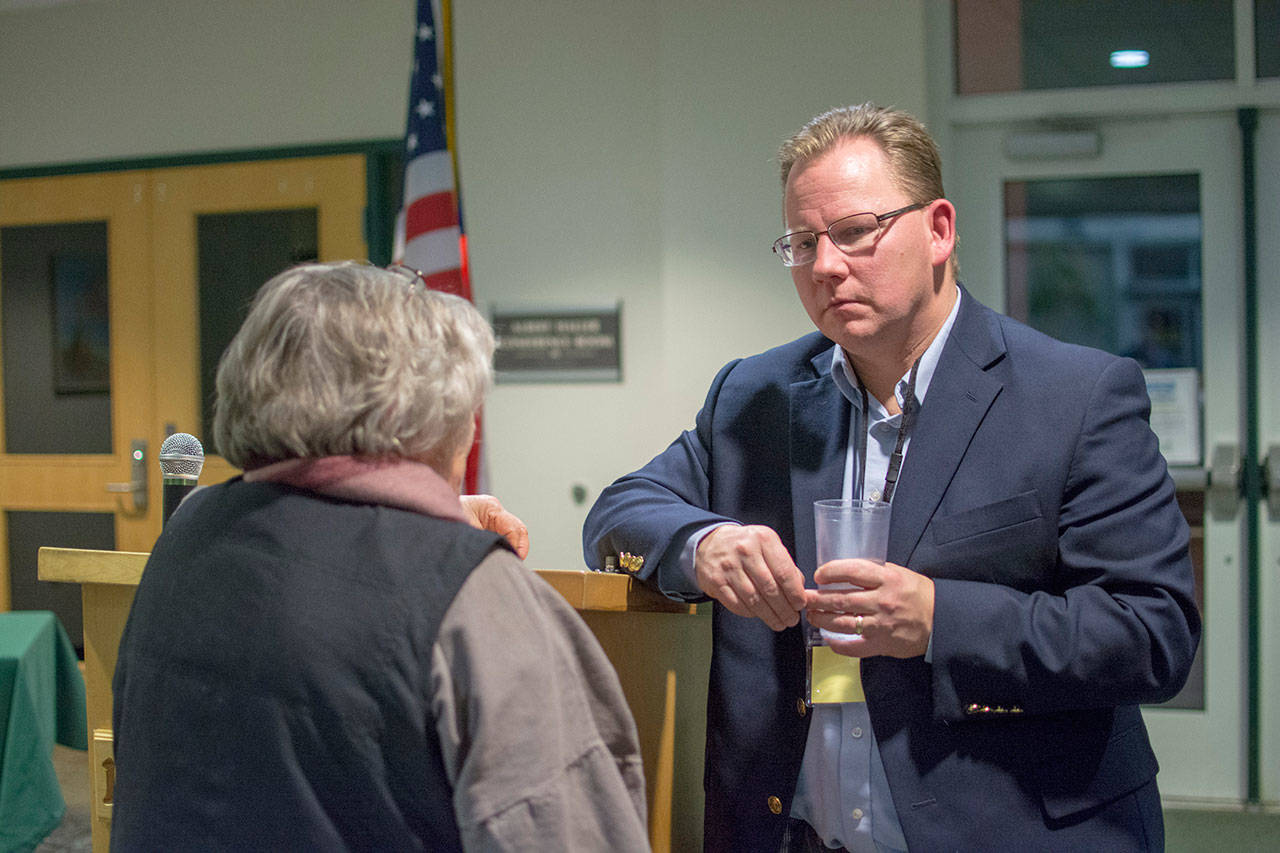On the heels of a paraeducator strike that shut down Port Angeles schools last week, state Superintendent of Public Instruction Chris Reykdal visited Port Angeles and offered ideas to better fund education.
Reykdal, who is in his first term in the state position, came to Port Angeles because he is hosting forums throughout the state this month. The Nov. 19 forum in Port Angeles was the only one on the North Olympic Peninsula.
He told a crowd — mostly of school officials from Clallam County — at the Lincoln Center that he would like school districts to have the opportunity to raise their enrichment levies again and the state should put more money toward special education.
“There is no such thing as a Washington, D.C., or Olympia solution that you can cast about the land and make everyone OK,” Reykdal said.
“And that means we at OSPI believe the Legislature went a little too far in cutting those levies and we think that should come back — not to where it was — somewhere about halfway.”
The state Legislature reworked its formulas and boosted state funding to all school districts in response to the McCleary decision, in which the state Supreme Court found that the state had violated its constitution by under-funding K-12 public schools.
The Legislature had been in contempt of court since 2014 for lack of progress on that ruling, and daily sanctions of $100,000 — allocated specifically for education spending — had been accruing since August 2015. The decision forced lawmakers to pour billions of dollars into the K-12 school system.
In that, the Legislature also capped local levies at $1.50 per $1,000 of valuation. While some districts, like the Sequim School District, were largely unaffected by the cut, the Port Angeles School District saw its levy cut in half.
That resulted in the state providing $6.5 million to the Port Angeles School District and cutting the district’s levy by $2.2 million next year. Starting the following year, the levy is cut in half to about $4.5 million and capped at $1.50 per $1,000 of assessed valuation.
“We know that school districts are still spending hundreds of millions of dollars a year out of local levy dollars for special education,” Reykdal said. “That is clearly a special ed obligation.”
Teachers and pareducators in the Port Angeles School District — who have seen their peers at other districts across the state and county negotiate double-digit raises — fought for and received raises, despite Port Angeles School District not seeing the same boost in funding that others saw.
Despite the levy cut significantly affecting the Port Angeles School District, Superintendent Martin Brewer does not feel putting the burden back on to local taxpayers is the solution.
“That concerns me,” Brewer said, citing Port Angeles and Sequim school districts as examples.
While the levies for both districts will be capped at $1.50 per $1,000 valuation, the Sequim School District has a significantly larger tax base.
Both districts will receive the same amount of money from the state per student to support basic education, but the Sequim School District has a larger tax base on which to draw local tax dollars from, he said.
“In theory Sequim can afford to tax at $1.50 and we would be able to raise our taxes on our local tax base to cover our costs … actually concerns me a lot,” Brewer said. “I really struggle with that one.”
He said a solution for the Port Angeles School District would be for the state to address special education. He said Port Angeles is the “hub” for special needs services.
The district is spending about $850,000 of local levy money to meet the needs of special needs students, he said.
Sequim School District Superintendent Gary Neal said the levy cap was “like a shower of cold water” for districts that weren’t prepared for the loss in local funding.
“For Sequim we were able to move the needle up a bit … but for many districts it’s a financial burden,” Neal said.
Neal said he appreciates Reykdal’s vision and said more local control would be nice.
“As he said in his presentation, trying to get 295 school districts to do the same thing at the same time is just not going to happen,” Neal said.
Brewer and Crescent School District Superintendent Dave Bingham both expressed concerns over how the state addressed regionalization. Regionalization gives some districts additional funding while others miss out.
Sequim and Port Angeles School Districts each saw a 6 percent regionalization factor, though it is only temporary for the Port Angeles School District. Crescent didn’t see any regionalization boost.
“The truth is the majority of my staff live and community for an opportunity to earn 6 percent less,” Bingham said.
“Regionalization is something we’re highly concerned about. It really doesn’t feel good to tell my teachers they can’t make quite what they do in the neighboring districts.”
Jesse Major is a reporter with the Olympic Peninsula News Group, which is composed of Sound Publishing newspapers Peninsula Daily News, Sequim Gazette and Forks Forum. He can be reached at 360-452-2345, ext. 56250, or at jmajor@peninsuladailynews.com.



